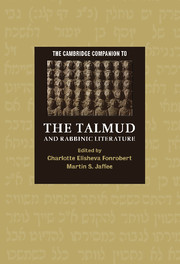Book contents
- Frontmatter
- Introduction: The Talmud, Rabbinic Literature, and Jewish Culture
- Part I: The Conditions of Rabbinic Literary Activity
- 1 Rabbinic Authorship as a Collective Enterprise
- 2 The Orality of Rabbinic Writing
- 3 Social and Institutional Settings of Rabbinic Literature
- 4 The Political Geography of Rabbinic Texts
- Part II: The Genres of Rabbinic Literary Composition
- Part III: Hermeneutical Frames for Interpreting Rabbinic Literature
- Bibliography
- Index
- Source Index
- Series List
1 - Rabbinic Authorship as a Collective Enterprise
from Part I: - The Conditions of Rabbinic Literary Activity
Published online by Cambridge University Press: 28 November 2007
- Frontmatter
- Introduction: The Talmud, Rabbinic Literature, and Jewish Culture
- Part I: The Conditions of Rabbinic Literary Activity
- 1 Rabbinic Authorship as a Collective Enterprise
- 2 The Orality of Rabbinic Writing
- 3 Social and Institutional Settings of Rabbinic Literature
- 4 The Political Geography of Rabbinic Texts
- Part II: The Genres of Rabbinic Literary Composition
- Part III: Hermeneutical Frames for Interpreting Rabbinic Literature
- Bibliography
- Index
- Source Index
- Series List
Summary
ALL THAT WRITING – AND NO WRITERS? THE PUZZLE OF RABBINIC AUTHORSHIP
Rabbinic literature of Late Antiquity certainly had its audience. But can it be said to have had authors? From the perspective of the rabbinic tradition itself, the axiomatic answer is, of course, “no.” A half millennium of tradition, the Mishnah tells us, links the moment at which “Moses received Torah from Sinai” to the teachings of the Men of the Great Assembly who, in the shadow of Persian hegemony, “said three things: be cautious in judgment, raise up many disciples, and build a fence for the Torah”
(M. Avot 1:1). In the rabbinic view, formulations of collective rabbinic wisdom, such as those ascribed to the Men of the Great Assembly, are “said,” “received” or “heard,” and “transmitted.” But they are not “authored.” Not any more than a rhythmic refrain, stemming out of seventeenth-century West African tribal dance, that - transplanted with its enslaved bearers to the cotton fields of the American South - adopts the musical scale of Scotch-Irish reels and emerges in 1938 as a chord progression supporting this recorded confession of a Robert Johnson:
I went down to the crossroad, fell down on my knees;
I went down to the crossroad, fell down on my knees;
asked the Lord above “Have mercy now, save poor Bob if you please.”
- Type
- Chapter
- Information
- Publisher: Cambridge University PressPrint publication year: 2007
- 7
- Cited by



